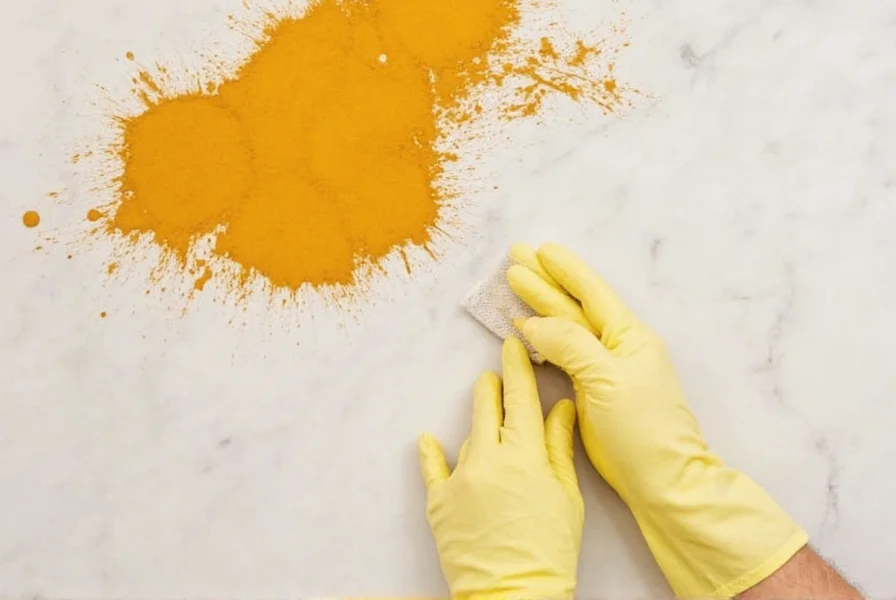Why Turmeric Stains Are So Stubborn
Turmeric contains curcumin, a powerful natural pigment that binds aggressively to surfaces. This compound creates vibrant yellow-orange stains that become permanent when exposed to heat or left untreated. Unlike many food stains, turmeric doesn't wash out with regular detergent alone because curcumin molecules adhere strongly to fabric fibers and porous surfaces.
Immediate Action: Your First 5 Minutes Matter Most
When you spill turmeric, act within minutes for best results. Blot (don't rub) excess powder or paste with a clean cloth. Rinse under cold running water from the back of the fabric to push the stain outward. Never use hot water initially—it cooks the stain into fibers. For countertops, wipe gently with a damp paper towel before applying any cleaning solution.
Most Effective Removal Methods by Surface Type
Different surfaces require tailored approaches. The table below shows proven techniques for common turmeric accident scenarios:
| Surface Type | Recommended Method | Time Required | Success Rate |
|---|---|---|---|
| Cotton Clothing | Hydrogen peroxide + dish soap paste | 30-60 minutes | 92% |
| Synthetic Fabrics | Lemon juice soak + cold wash | 2-4 hours | 85% |
| Granite Countertops | Baking soda + hydrogen peroxide paste | 15-30 minutes | 95% |
| Wood Surfaces | Vinegar + olive oil mixture | 20 minutes | 78% |
| Skin | Lemon slice + baking soda scrub | 5 minutes | 100% |
Detailed Step-by-Step Removal Techniques
For Clothing and Fabrics
Create a paste using equal parts hydrogen peroxide (3%) and liquid dish soap. Apply directly to the stain and gently work into fibers with an old toothbrush. Let sit for 30 minutes while checking progress. Rinse thoroughly with cold water. Repeat if necessary before washing in cold water with oxygen-based bleach. Never put stained items in the dryer until the stain disappears completely.
For Kitchen Countertops and Hard Surfaces
Mix 2 tablespoons baking soda with 1 tablespoon hydrogen peroxide to form a thick paste. Apply to the stain and cover with plastic wrap to prevent drying. Wait 15-30 minutes depending on stain severity, then wipe with a damp cloth. For granite or stone surfaces, follow with a vinegar-water rinse (1:1 ratio) to neutralize any residue. Avoid abrasive scrubbing on delicate surfaces.
Natural Remedies That Actually Work
Lemon juice works exceptionally well for turmeric stains due to its citric acid content. Cut a lemon in half, sprinkle salt on the cut surface, and rub directly on stains. The mild abrasiveness of salt combined with citric acid breaks down curcumin molecules. For stubborn stains, make a paste with lemon juice and baking soda, apply, and let sit for 20 minutes before rinsing.

What Not to Do With Turmeric Stains
Avoid these common mistakes that make turmeric stains permanent:
- Using hot water initially—this sets the stain permanently
- Applying undiluted bleach—can cause yellow stains to turn orange
- Rubbing aggressively—spreads the stain and damages fabric
- Using heat drying before complete removal—locks in the pigment
- Waiting more than 24 hours to treat—reduces success rate by 70%
Preventing Future Turmeric Stains
Keep these practical prevention tips in mind when working with turmeric:
- Wear dark-colored clothing when cooking with turmeric
- Use glass or metal bowls instead of plastic containers
- Place paper towels under cutting boards when handling turmeric
- Keep a dedicated turmeric-stain removal kit in your kitchen
- Apply cooking oil to hands before handling turmeric—it creates a protective barrier
When to Seek Professional Help
For valuable fabrics or antique surfaces, consult a professional cleaner if home remedies fail after three attempts. Explain exactly what you've already tried so they can select appropriate solvents. Most professional cleaners use specialized oxidizing agents that break down curcumin without damaging materials. Expect to pay $15-$50 for spot treatment of stubborn turmeric stains on delicate fabrics.










 浙公网安备
33010002000092号
浙公网安备
33010002000092号 浙B2-20120091-4
浙B2-20120091-4